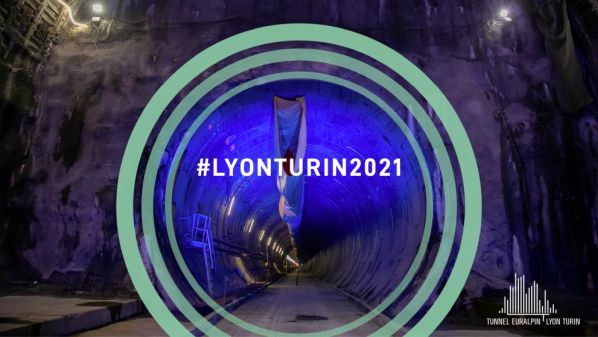TUNNEL Euralpin Lyon Turin (Telt) has awarded contracts worth €3bn to three consortia of 13 companies to undertake 80% of the tunnelling required for the 57.5km twin-bore base tunnel that is a key part of the Lyon - Turin high-speed line.
The 270km line will form a connection across the Alps for the TEN-T Mediterranean Corridor. The twin-bore base tunnel will run between St Jean de Maurienne, France, and Chiomonte, Italy, allowing passenger trains to cross the Alps at 220km/h and freight to operate at 120km/h.. The dual-bore tunnel will be one of the longest in the world. Five Tunnel Boring Machines (TBM) will be in use at the peak of construction.
The line will remove more than one million lorries from the roads over the Alps, with significant environmental and economic benefits. Construction of the base tunnel is expected to be completed in 2032.
The project has a protracted history. It was first proposed in the 1990s and civil engineering commenced in 2002. However, disagreements over the project between the French and Italian governments consistently held up meaningful progress. Italy finally ended months of political deadlock in July 2019 when former prime minister, Mr Giuseppe Conte, confirmed his commitment to continue with the project that both countries had backed under an agreement reached in 2015, which was ratified by both governments in 2017.
The provisional work resulted in the excavation of 30km of tunnels, more than 18% of the 162km required, which will include the two parallel tunnels, four access adits and 204 safety bypasses. 113km of exploratory surveys and core drilling in Italy and France have also been carried out.
The European Commission (EC) says the tender procedure represents one of the largest single tenders in Europe during the last two years. The project is being co-financed by the European Union (EU), Italy and France, with 40% of the project cost covered by the Connecting Europe Facility (CEF). The European Climate, Infrastructure and Environment Executive Agency (CINEA) will continue to monitor the project.
Telt says the tender process was hindered by the Covid-19 pandemic, which restricted access to the site and the ability to conduct face-to-face meetings. However, the company was still able to meet the requirements to deal with the complexity of the bids analysed, including processing the nearly 30,000 documents received. The bids were evaluated between June 2020 and May 2021 by a team of 70 people, with 138 negotiation meetings held between Telt management and executives and candidate companies.
The economic criterion was enhanced with technical criterion that assessed the quality of the proposed solutions. In particular, the companies made an effort to include people with work difficulties, proposing more than double the number of hours of the basic requirement for this quota of employees.
On the environmental front, the consortia have proposed ad hoc solutions and measures to ensure the environmental sustainability of construction sites, with dedicated teams and precise monitoring of environmental and social indicators. The companies have made a special commitment to environmental protection during work and to use of clean energy and biofuels to provide nearly 100% green energy construction sites.
“Today’s decision to award three contracts worth €3bn is a significant step towards completing the Lyon-Turin rail connection,” says European commissioner for transport, Ms Adina Vălean. “It will bridge a key missing link between France and Italy and help shift large volumes of cross-border traffic from road to rail. But it is more than a bi-national project, as it will become the nexus connecting the Iberian Peninsula to the Eastern part of the European Union. The Lyon-Turin rail connection is a long-awaited, well-thought-out, and highly emblematic European project, contributing to the objectives of the European Green Deal.”
Winning consortia
Lot 1 (€1.47bn): Eiffage Génie Civil (group head), Spie Batignolles, Ghella, and Cogeis.
The companies will build the 22km stretch of tunnel between the existing Villarodin - Bourget/Modane tunnel and Italy. The tunnels will be excavated in approximately six years, with two TBM used to tunnel the line towards Turin, while traditional methods with hydraulic breakers and explosives will be used towards Lyon.
The consortia will construct the Modane safety site, maintenance and emergency tunnels located every 333m between the two tunnels, which are required for safety, and all the refuge and transverse tunnels for operation and safety.
Lot 2 (€1.43bn): Vinci Construction Grands Projets (group head), Dodin Campenon Bernard, Vinci Construction France TP Lyon, and Webuild.
The consortium will excavate 23km of dual-bore tunnel between Saint-Martin-la-Porte, La Praz and Modane, continuing the 10km section already completed at Saint-Martin-la-Porte. 25km will be tunnelled using three TBM, while 21km of tunnelling through the more geologically complex sections will be excavated using traditional drill-blast methods. The project will take five years and five months.
The consortia will construct the La Praz safety site, communication, technical rooms, niches and tunnels for operation and safety. Webuild and Vinci have a 50:50 share in the consortium.
Lot 3 (€228m): Implenia Suisse (group head), Implenia France, NGE, Itinera, and Rizzani De Eccher.
The consortium will build the section of tunnel between the French portal at Saint-Julien-Montdenis and Saint-Martin-la-Porte using traditional methods. It will also build the Villard-Clément platform between the cut and cover artificial tunnel to the west and the natural entrance of the tunnel into the mountain to the east. Construction will take five years and 10 months.
For detailed data on rail projects around the world, subscribe to IRJ Pro.

